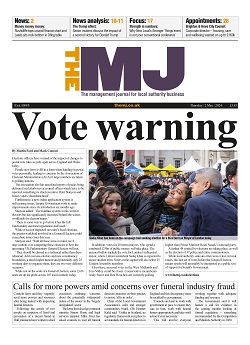This year's PPMA conference was a sell-out, which was a fantastic achievement. Against the context of a better than expected budget settlement, local government has some breathing space to consider issues that impact the future of our work and our workforce.
With this in mind, PPMA board members set out to create an agenda that would appeal to the widest possible audience and stimulate conversation around immediate and longer-term issues. it was also about showcasing what HR has achieved and continues to achieve cross the public sector.
From presentations on the future of work it is clear technology developments and innovation are emerging at speed. We need to keep pace as a profession and learn from one another in order to capitalise on opportunities to improve services.
Victoria Downing-Burn and Jane Graham demonstrated this principle, sharing three priorities for HR and OD based on their work with Somerset Integrated Care System. First, demystify what the system is and what it means to people.
Then, understand how to connect and involve all relevant parties to discuss delivery of health and care strategies in your local area. And most importantly, create equitable conditions for design and delivery by understanding the perspective of each party, creating a shared purpose and common language and drawing on collective strengths and knowledge.
As a sector that constantly strives to find ways to improve services it is critical we build organisational resilience – including the ability of the entire organisation to respond effectively to unexpected events, crises and challenges.
Perry Timms of People and Transformational HR (PTHR) stressed that means HR needs to stay alive to what is changing and be able to adapt systems and processes accordingly.
Our ability to adapt and improve services is dependent on having the right skills and experience.
In the face of ongoing workforce challenges, there was much conversation about how we need to think about talent differently eg what it is and where we look for it. We also need to keep a laser focus on employee experience by strengthening equality, diversity and inclusion in general. With an ageing, female-dominated workforce, menopause support should form a critical part of retention strategies.
Employee experience can either be enhanced or undermined by hybrid working. It was reassuring to hear from Juliette Alban-Metcalfe that based on research conducted by Real World Group, most organisations understand that getting it right is important, but we are still on a journey. Creating the right culture and thinking about the type of leadership needed are all still priorities.
Linked to this point, Andi Britt of IBM Consulting outlined how HR and the employee experience is being reimagined with AI and automation. Employees expect interactions at work to be as intuitive and as hassle free as using their smart phone. This means HR needs to strip out complex processes, remove unnecessary approvals and make HR processes simpler.
The conference was also an opportunity to celebrate achievements and emerging talent. The personal stories and journeys of our talent programme winners led me to conclude that the future of HR and of local government will be in safe hands. Similarly, the gala dinner was an opportunity to celebrate the best of our profession from over the last 12 months. Congratulations to all our award winners and colleagues that were shortlisted.
Back at work, I am conscious that delegates are trying to implement some of this rich learning in their own organisations.
I leave you with wisdom shared by keynote speaker, Ian Thomas, the town clerk and chief executive of the City of London Corporation, who also writes for The MJ here. He said: ‘Perfection doesn’t exist and so we need to embrace imperfection in the transformation of our working cultures.’
Wise words indeed.
Gordon McFarlane is president of the PPMA
@PPMA_HR



